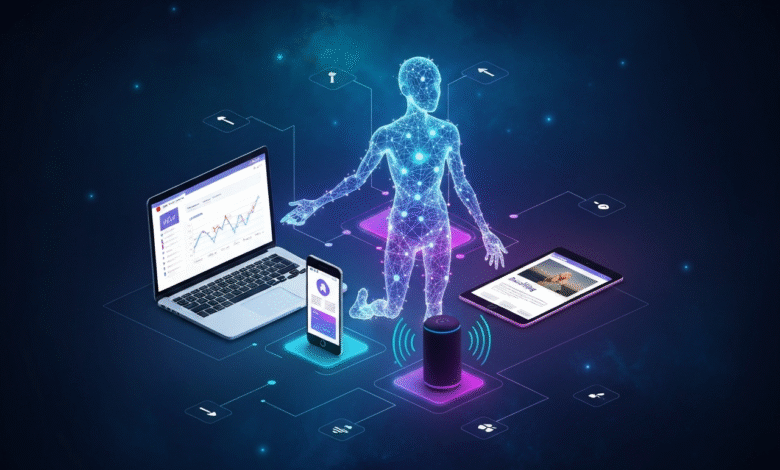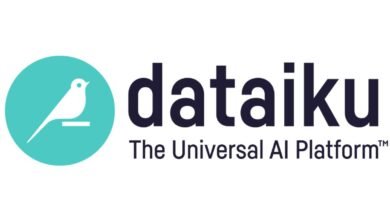Is Your Website Ready for AI Agents? Here’s What to Fix

▼ Summary
– AI agents now drive one-third of brand-related search traffic and shape customer journeys by meeting them wherever and whenever they want.
– Enterprise AI faces challenges with complex workflows and unstructured data, requiring websites to evolve into consistent data hubs for agentic experiences.
– Vertical AI agents, built for specific industries, deliver context-rich and outcome-driven experiences, unlike general horizontal agents that lack depth and personalization.
– Well-designed AI agents reduce friction and deepen loyalty through omnichannel consistency and hyper-personalization using customer data and history.
– Implementing AI agents across the entire customer journey, as shown in hospitality and financial services, leads to seamless experiences, higher conversions, and significant cost savings.
Today’s path to purchase is anything but straightforward, shaped by individual preferences, shifting moods, and fluctuating interest levels. AI agents now make it possible to meet the customer wherever and whenever they want, fundamentally altering how brands connect with audiences. Recent data reveals these agents already drive one-third of brand-related search traffic, meaning what customers learn about your business depends entirely on what these intelligent systems discover and choose to present.
The core challenge lies in the limitations of large language models powering enterprise AI solutions. These systems often struggle with complex workflows, unstructured proprietary data, isolated information silos, and strict compliance requirements. They simply aren’t designed to deliver accurate, context-rich responses at the scale modern businesses demand.
To address this gap, websites must transform into centralized data hubs that distribute consistent, structured content across all channels and touchpoints. As tools like Google’s AI Overview make search more intelligent and personalized, users will increasingly expect websites to anticipate their needs and simplify the research, planning, and decision-making process.
Achieving this consistently at scale presents significant hurdles. Human-led processes often break under volume, while organizational silos create fragmented customer experiences. The hidden costs include lost knowledge, missed opportunities, and weakened customer loyalty.
Not all AI agents deliver equal value. Businesses typically choose between two implementation approaches: horizontal agents that function as generalists and vertical agents designed as specialists.
Horizontal agents like Gemini or ChatGPT work across multiple industries but face inherent limitations. They often lack depth in industry-specific nuances and miss critical brand context. Even with retrieval-augmented generation technology, they piece together answers from predefined knowledge bases, frequently resulting in disjointed responses. While suitable for basic questions, these generalists rarely anticipate needs, personalize effectively, or drive meaningful outcomes like leads and conversions.
Vertical agents represent a fundamentally different approach. Built for specific industries and business use cases, they train on your products, policies, and brand voice while evolving alongside your organization. Unlike generalists, vertical agents deliver context-rich, brand-aligned experiences that drive outcomes from discovery and qualification through conversions, upsells, and loyalty building. They function as true digital brand representatives, maintaining consistency across every customer interaction.
Recent advances in multi-agent frameworks, orchestration layers, vector databases, and cloud-native infrastructure have transformed the brittle, rule-based bots of the past into enterprise-grade agents capable of meeting modern expectations at scale.
A well-designed AI agent reduces friction while deepening customer loyalty, with benefits visible across omnichannel interactions and personalization capabilities. A single agent can engage customers across your website, mobile app, social platforms, and messaging channels while maintaining consistent voice and style. Information shared on one channel carries over to the next, creating less friction, greater efficiency, and a seamlessly interconnected experience.
Sophisticated agents integrate deeply with customer data platforms, CRM systems, and booking engines. They track customer history, loyalty status, and preferences while adapting in real time. Each interaction sharpens their knowledge, evolving experiences from personalized to genuinely hyper-personalized, resulting in stronger engagement, customer delight, and lasting loyalty.
AI agents deliver maximum value when aligned with the entire customer journey rather than handling isolated tasks. In hospitality, this means supporting every stage from discovery and booking through the actual stay and post-checkout follow-up. During discovery, agents help travelers plan trips, explore destinations, and build itineraries by surfacing relevant events, activities, and special offers. At conversion, they integrate with booking engines to answer availability questions, apply promotions, and simplify reservations. Throughout the experience, they personalize on-site interactions by recommending dining options, activities, or upgrades based on guest history and preferences. After purchase, they sustain engagement by offering loyalty benefits, sending reminders, and suggesting repeat visits.
When AI agents connect across the complete customer journey, they deliver innovative, seamless experiences characterized by fewer irrelevant messages, reduced friction, and more timely, personalized interactions. The outcome includes smoother customer journeys, lower drop-off rates, and higher conversion percentages.
Industry applications demonstrate the power of specialized vertical agents. In hospitality, when a guest visits a hotel website, the agent connects to the customer data platform to gather information, identify personas, and anticipate intent before surfacing relevant offers in real time. For anonymous visitors, it might highlight pet-friendly accommodations, family packages, dining options, and local activities. For returning guests, it could offer reservation changes, stay extensions, and updated recommendations while recalling past visits, preferences, and loyalty rewards. This creates memory at scale, delivering a “personal concierge” experience.
Financial services benefit similarly. When prospects inquire about savings accounts, the AI agent uses personal data and past interactions to anticipate information needs before responding with clear, structured details about APY, fees, and eligibility requirements. Loan explorers receive guided workflows that capture intent, provide instant pre-qualification, and schedule meetings. Returning customers get tailored follow-ups, updated rates, pre-approved offers, and clear next steps. The agent functions as a financial advisor rather than a simple chatbot, strengthening engagement, trust, and loyalty.
Consider the outdoor hospitality brand that implemented a supervisor multi-agent framework to streamline guest interactions. When a guest asked about weekend family activities and cabin availability near the lake, the system coordinated multiple specialized agents. A supervisor agent interpreted intent and routed the request appropriately. A Q&A agent handled general property questions while an events agent surfaced weekend activities like BBQ nights and guided hikes. A trip planning agent suggested itineraries using mapping and scheduling tools, while a booking agent checked cabin availability and completed the reservation. A lead collection agent then passed references to the CRM for follow-up.
The outcome transformed the guest experience: visitors transitioned seamlessly from discovery to booking within a single conversation. The brand achieved measurable results including 99.35% customer satisfaction, a 68% improvement in query resolution, and projected annual cost savings exceeding $500,000.
(Source: MarTech)





